
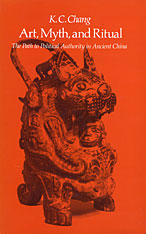

The importance of the rich corpus of “Masters Literature” that developed in early China since the fifth century BCE has long been recognized. But just what are these texts? Scholars have often approached them as philosophy, but these writings have also been studied as literature, history, and anthropological, religious, and paleographic records. How should we translate these texts for our times?
This book explores these questions through close readings of seven examples of Masters Literature and asks what proponents of a “Chinese philosophy” gained by creating a Chinese equivalent of philosophy and what we might gain by approaching these texts through other disciplines, questions, and concerns. What happens when we remove the accrued disciplinary and conceptual baggage from the Masters Texts? What neglected problems, concepts, and strategies come to light? And can those concepts and strategies help us see the history of philosophy in a different light and engender new approaches to philosophical and intellectual inquiry? By historicizing the notion of Chinese philosophy, we can, the author contends, answer not only the question of whether there is a Chinese philosophy but also the more interesting question of the future of philosophical thought around the world.

K. C. Chang approaches the civilization of ancient China from the point of view of an anthropologist as well as from an archaeological perspective. He brings to bear on his subject familiarity with the Chinese materials and with the related data essential to placing the Chinese experience in context.
This volume of nine studies deals with the Shang (1766-1122 BCE) and Chou (1122-221) civilizations and the prehistoric cultures from which they sprang. Chang summarizes what is known about ancient crop cultivation and examines evidence concerning the transition from a food-gathering to a settled food-producing society. He discusses the origin of Chinese urbanism; the structure of Shang and Chou towns and the kinship and lineage system of this period; the preparation and serving of food in ancient China; the possibility of a coherent dualistic system in Shang society; and Shang and Chou mythology. One essay is published here for the first time; the others have been revised for this book. An extensive bibliography is appended.
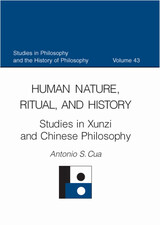

In Classical China, crafted artifacts offered a material substrate for abstract thought as graphic paradigms for social relationships. Focusing on the fifth to second centuries B.C., Martin Powers explores how these paradigms continued to inform social thought long after the material substrate had been abandoned. In this detailed study, the author makes the claim that artifacts are never neutral: as a distinctive possession, each object—through the abstracting function of style—offers a material template for scales of value. Likewise, through style, pictorial forms can make claims about material “referents,” the things depicted. By manipulating these scales and their referents, artifacts can shape the way status, social role, or identity is understood and enforced. The result is a kind of “spatial epistemology” within which the identities of persons are constructed. Powers thereby posits a relationship between art and society that operates at a level deeper than iconography, attributes, or social institutions.
Historically, Pattern and Person traces the evolution of personhood in China from a condition of hereditary status to one of achieved social role and greater personal choice. This latter development, essential for bureaucratic organization and individual achievement, challenges the conventional opposition between “Western” individuals and “collective” Asians.
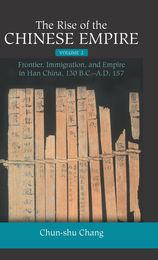
The second and first centuries B.C. were a critical period in Chinese history—they saw the birth and development of the new Chinese empire and its earliest expansion and acquisition of frontier territories.
But for almost two thousand years, because of gaps in the available records, this essential chapter in the history was missing. Fortunately, with the discovery during the last century of about sixty thousand Han-period documents in Central Asia and western China preserved on strips of wood and bamboo, scholars have been able, for the first time, to put together many of the missing pieces.
In this second volume of his monumental history, Chun-shu Chang provides the first systematic reconstruction of the history of the acquisitions and colonization undertaken by the Chinese empire. In never before seen detail, Chang discusses the actions taken by the Chinese empire to develop the Han frontier: the government promoted massive immigration to the newly conquered virgin land; an innovative and complex garrison system was created; and civil institutions and a land system, as well as a regular imperial administration, were established over the region. Chang investigates the long and massive campaigns of the Han territorial expansion movement, considers the impact of early nation-building, and explores the formation and growth of the Chinese empire and its changing national identity. Chang’s comprehensive reconstruction of ancient and early Imperial Chinese history, based on literary, archaeological, and recently discovered ancient texts and classics, reveals the process and mechanics of the Han frontier development through an innovative and complex system of colonization, the core mechanics of the Han empire-building enterprise.
Chun-shu Chang is Professor of History at the University of Michigan and is the author, with Shelley Hsueh-lun Chang, of Crisis and Transformation in Seventeenth-Century China and Redefining History: Ghosts, Spirits, and Human Society in P’u Sung-ling’s World, 1640 – 1715.
"An extraordinary survey of the political and administrative history of early imperial China, which makes available a body of evidence and scholarship otherwise inaccessible to English-readers. The underpinning of research is truly stupendous.”
—Ray Van Dam, Professor, Department of History, University of Michigan
“Powerfully argues from literary and archaeological records that empire, modeled on Han paradigms, has largely defined Chinese civilization ever since.”
—Joanna Waley-Cohen, Professor, Department of History, New York University
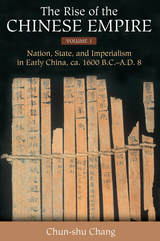
The second and first centuries B.C. were a critical period in Chinese history—they saw the birth and development of the new Chinese empire and its earliest expansion and acquisition of frontier territories. But for almost two thousand years, because of gaps in the available records, this essential chapter in the history was missing. Fortunately, with the discovery during the last century of about sixty thousand Han-period documents in Central Asia and western China preserved on strips of wood and bamboo, scholars have been able, for the first time, to put together many of the missing pieces.
In this first volume of his monumental history, Chun-shu Chang uses these newfound documents to analyze the ways in which political, institutional, social, economic, military, religious, and thought systems developed and changed in the critical period from early China to the Han empire (ca. 1600 B.C. – A.D. 220). In addition to exploring the formation and growth of the Chinese empire and its impact on early nation-building and later territorial expansion, Chang also provides insights into the life and character of critical historical figures such as the First Emperor (221– 210 B.C.) of the Ch’in and Wu-ti (141– 87 B.C.) of the Han, who were the principal agents in redefining China and its relationships with other parts of Asia. As never before, Chang’s study enables an understanding of the origins and development of the concepts of state, nation, nationalism, imperialism, ethnicity, and Chineseness in ancient and early Imperial China, offering the first systematic reconstruction of the history of Chinese acquisition and colonization.
Chun-shu Chang is Professor of History at the University of Michigan and is the author, with Shelley Hsueh-lun Chang, of Crisis and Transformation in Seventeenth-Century China and Redefining History: Ghosts, Spirits, and Human Society in P’u Sung-ling’s World, 1640 – 1715.
“An extraordinary survey of the political and administrative history of early imperial China, which makes available a body of evidence and scholarship otherwise inaccessible to English-readers. The underpinning of research is truly stupendous.”
—Ray Van Dam, Professor, Department of History, University of Michigan
“Powerfully argues from literary and archaeological records that empire, modeled on Han paradigms, has largely defined Chinese civilization ever since.”
—Joanna Waley-Cohen, Professor, Department of History, New York University

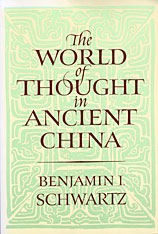
The center of this prodigious work of scholarship is a fresh examination of the range of Chinese thought during the formative period of Chinese culture. Benjamin Schwartz looks at the surviving texts of this period with a particular focus on the range of diversity to be found in them. While emphasizing the problematic and complex nature of this thought he also considers views which stress the unity of Chinese culture.
Attention is accorded to pre-Confucian texts; the evolution of early Confucianism; Mo-Tzu; the “Taoists,”; the legalists; the Ying-Yang school; and the “five classics”; as well as to intellectual issues which cut across the conventional classification of schools. The main focus is on the high cultural texts, but Mr. Schwartz also explores the question of the relationship of these texts to the vast realm of popular culture.
READERS
Browse our collection.
PUBLISHERS
See BiblioVault's publisher services.
STUDENT SERVICES
Files for college accessibility offices.
UChicago Accessibility Resources
home | accessibility | search | about | contact us
BiblioVault ® 2001 - 2024
The University of Chicago Press









